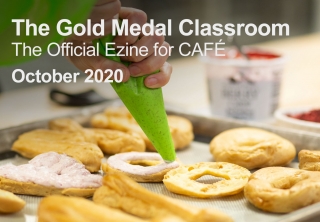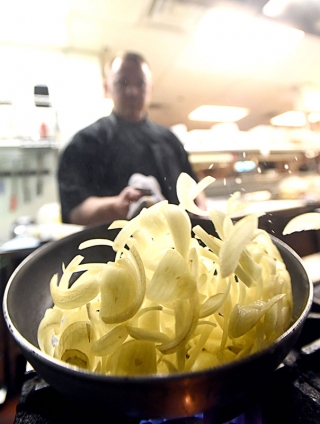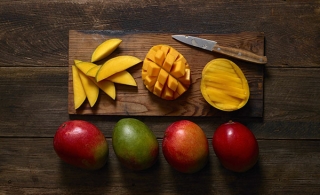
2020 Gold Medal Classroom Article Index
04 December 2020GMC responds to 2020’s unique challenges with three new sections and a plethora of ingredient articles ripe and ready for the culinary classroom.
By Lisa Parrish, GMC Editor
 2020 has truly been a year like none other. CAFÉ’s Gold Medal Classroom has responded to the year’s challenges by publishing articles and stories designed to help culinary instructors from high school to four-year degree programs successfully navigate the next chapter of culinary education.
2020 has truly been a year like none other. CAFÉ’s Gold Medal Classroom has responded to the year’s challenges by publishing articles and stories designed to help culinary instructors from high school to four-year degree programs successfully navigate the next chapter of culinary education.
Even though GMC is not a book, it can be accessed over and over again at www.CafeMeetingPlace.com. Just like your favorite cookbook, you can read articles you may have missed or refresh yourself on stories you found interesting. Look for features that focus on online culinary education, the movers and shakers in the culinary industry, tips and ideas for classroom instruction, and instructional resources from the foodservice industry.

Each month CAFÉ sends an edition announcement informing you of the new stories posted on the website www.CafeMeetingPlace.com, Facebook and Instagram or @CafeMeetingPlace. If you are not receiving these emails, please click here to register for the notice. You won’t miss another GMC story in 2021!
FEATURE ARTICLES
Ingredients
- Using traditional Asian flavors untraditionally.
- The must-knows of mustard: Tiny mustard seeds creating condiments to medicinal applications.
- Chefs mashup flavors to create unusual combinations with familiar turkey.
- Influencing children’s diets through menu development: Strategies for updating kids’ fare beyond offering all menu items in smaller portions.
- Sauces for salads: Salad dressing flavor ideas from fruit to protein to mustard.
- Discover Mediterranean cheese: Popular Greek yogurt opened the Mediterranean cheese market beyond basic Feta.
- Make mine a lamb ham: Interest in meat preservation brings lamb hams back to menus.
- Don’t skimp on caramelizing onions: Tricks to speed up caramelizing onion time fall short on taste and texture.
- Fruit-forward twist on comfort foods: Diners turn to comfort foods in uncertain times. Update classic applications for the warmer months with a fruit-forward twist.
- Think like a butcher for maximum yield and value-added produce cuts.
- A lesson in high oleic soybean oil and shortening: Discover its features such as long shelf life, neutral flavor and healthy fat profile.
- Pass the mustard and know the facts: Teaching mustard’s flavor and heat. It’s more than just a spice or hotdog condiment.
- Mustard from Saskatoon, Canada, right to your kitchen: Chef Steve Squire discusses prepared and powdered mustard in his favorite applications.
- Potatoes are a baker’s secret ingredient. Swapping spuds in baked goods means moister, tender products without altering flavor profiles.
- Selecting the right nontraditional pasta for healthy dishes requires knowledge about differing mouthfeel, flavor and application temperature.
Teaching during COVID-19
(Note: see Online Culinary Education below for complete story listing.)
- Teaching moment for restaurants and future restaurant managers: Report by the Sterling-Rice Group gives artful, innovative strategies for restauranteurs operating during Coronavirus restrictions.
- A Chicago college and Ohio high school share their plans for returning to the culinary classroom this fall.
- From NOLA to Your Baking & Pastry Classroom: View practical and informative virtual lessons on baking with raspberries from five top New Orleans chefs and NOCHI Culinary Instructor Zak Miller.
- Creative food kits spur culinary inspiration during at-home cooking instruction.
- Recipe builder uses flexible ingredients while creatively engineering flavors in global and regional cuisine during remote instruction.
Stories focusing on change
- Continuing a Case for Culinary Change: Second in a two-part series of articles focusing on how to achieve culinary education change.
- Part Two Fearless Innovation in the Face of Unflinching Change: Successful businesses are built by change agents who share similar leadership abilities.
- CAFÉ Embraces change in the culinary field. Definition of change (verb): make or become different. CAFÉ can help with that.
Other
- Breaking the Credibility Stigma of Non-restaurant Chefs: Cooking careers that include innovation, sustainability and celebrity chef special events are possible without restaurant experience.
- CAFÉ honors six culinary instructors and one business leader with 2020 awards.
MAYO’S CLINIC
- January – Part Two Making Program Changes: The complete six essential, non-linear stages of change.
- February – Enhancing and honoring civil behavior as well as respectful attitudes in classrooms.
- March – Dr. Fred Mayo suggests strategies to manage frustration in classrooms and help students learn to deal with anger.
- May – Gathering online teaching feedback from students and yourself.
- June/July – Building camaraderie and community in online teaching: Social distancing limits informal communication. Instructors fill in the gaps with purposeful projects to develop a sense of community.
- August – Zoom in on top teaching strategies to prepare students before and during a call to make using the platform successful for all.
- September – Zoom in on top teaching strategies. Part two.
- October – Help students combat Zoom fatigue by converting virtual lectures into organized class discussions engaging students and reducing fatigue.
- November – Helpful tips to stay organized, grounded and efficient when using Zoom in this new instructing reality.
THINK TANK
- January – Part Two Culinary Education Disruptors Ideation: Moving ideation forward and championing the role of culinary education disruptor.
- February – Education works best when teachers act as facilitators and not sole providers.
- March – Qualities and responsibilities of mentoring the future cooks and chefs who pass through your kitchen.
- May – Let’s grab the opportunity to lead change rather than have it chase us down the wrong path.
- June/July – Reach out to retired professional chefs to help guide students through turbulent times with seasoned eyes and breadth of experience.
- August – CAFÉ launches new podcast featuring leading chefs, restauranteurs, visionaries, educators and more to discuss current, compelling and relevant foodservice topics.
- September – We need to face the current harsh reality and stand up, take a deep breath, bring our teams together and ask the question: “Now what?”
- October – Building a curriculum around the ideal graduate.
- November – Education is more than a set of objectives. It is a significant time in a person’s life where the experience becomes as important as the building of skills.
50 MINUTE CLASSROOM
- January – Energy and Inspiration Gained from Making a Professional Change: Making a change in culinary education may mean leaving the field.
- February – Do’s and Don'ts of oral food presentations.
- March – Conducting a cooking competition: Create a simple capstone cooking competition for your program.
- May – Completion Speech - You are the key to your success. Find that open career door and run full speed through it.
- June/July – Cook with what you – actually – have on-hand. Teaching ingredient flexibility is important during pandemic-related shortages and challenging professional cooking situations.
- August – It is time to hit the books by going retro with assignments from older, non-textbooks and giving students a break from virtual learning while inspiring a new generation of readers.
- September – Teaching culinary topics across core subjects and using students’ interests as lesson plan inspiration.
- October – Basic seasoning and spicing. Part one.
- November – Virtually teaching delicious, healthy homemade Thanksgiving sides.
New in 2020: ONLINE CULINARY EDUCATION
- The Gold Medal Classroom produced four special issues during March and April focusing on assisting culinary instructors transition classes to an online format. Distant education also was covered in several monthly editions. A compilation of all CAFÉ’s culinary online strategy and resource stories can be found by clicking here.
New in 2020: CAFÉ Talks Podcast
- Have you heard CAFÉ Talks? New CAFÉ Talks podcast educates, enlightens, entertains and rewards listeners with the best of the culinary industry.
- Episode Five: The ethnicity of soul food with Chef Keith Taylor.
- Two additional CAFÉ Talks podcasts posted – creativity and innovation expert Bob Eckert and wine importer Jack Edwards featured on-air guests.
- CAFÉ Talks Podcasts posts interviews with culinary educator and flavorist. Discover what it takes to become a flavorist and ideas about retooling culinary education post COVID-19.
New in 2020: CHEF'S CORNER TABLE
- Corporate Executive Chef Richard Hoelzel of Idahoan Foods, LLC
Forecasting foodservice’s future and advising culinary students searching for employment based on a 35-year culinary career. - President of Complete Culinary LLC Christopher Koetke
Social media and adaptability are two skills Christopher Koetke predicts will be invaluable for success in the foodservice industry. - Morrison Healthcare Corporate R&D Chef Jeffrey Quasha
Learn how Morrison Healthcare morphed into reformatted café spaces with touch-less delivery systems, online ordering, food lockers and robot salad machines in a few short months due to COVID-19.
Click here to read the 2019 Gold Medal Classroom article Index.
